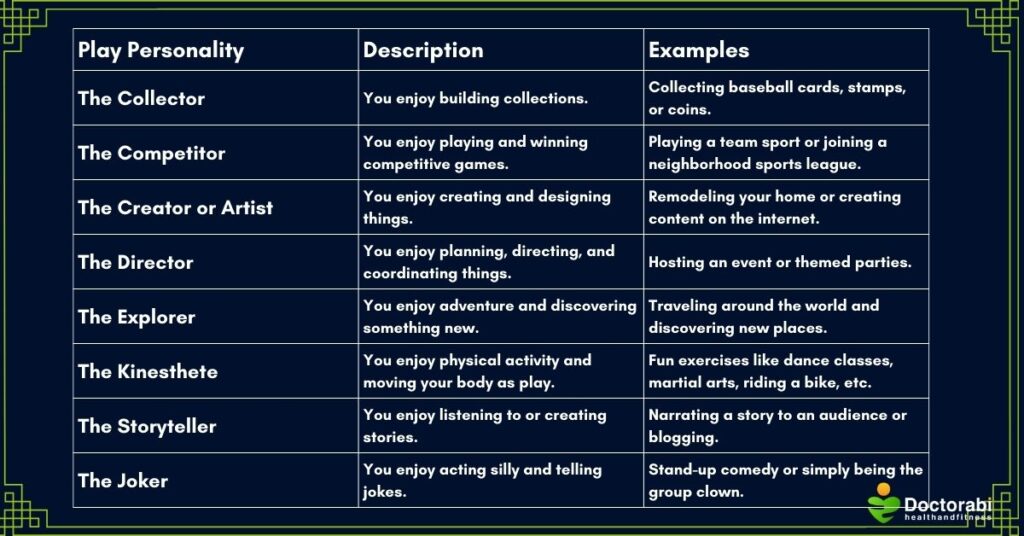“All work and no play makes Jack a dull boy.” This saying, first recorded in 1659, emphasizes the need to balance work and play to avoid burnout and boredom. Studies show that choosing work and achievement at the expense of fun, enjoyment, and freedom does not improve your life. In fact, it can make you less happy. On the other hand, if you aim for freedom, relaxation, and creating time for your hobbies, you will see an increase in your well-being, better sleep quality, increased life satisfaction, and less anxiety. The research concluded that having a balanced life and taking time to have fun and enjoy ourselves is very important and beneficial. So, what is play, and why is it important? And in today’s busy world, how can we maintain a healthy amount of play and achieve all the health benefits of a work-play balance?

What is play?
To play means to engage in an activity for enjoyment and recreation rather than a serious or practical purpose. There are no fixed rules for playing. Instead, let your imagination guide your play. Playtime is a time to forget about work and commitments and engage in a recreational activity for diversion or amusement. Play could be as simple as dancing for fun, playing a board game with your family, or hanging out with friends.
Health and well-being benefits of play

1. Less stress
Play is a great stress reliever. Unmanaged stress can contribute to many diseases, including heart disease, “The Number One Killer of Women.” Therefore, playing is a way to manage stress and prevent such diseases.
2. Better sleep
Playing improves your sleep quality, allowing you to sleep deeper and longer.
3. Less anxiety and depression
Playing causes your body to release endorphins, the feel-good hormones that can improve your mood and reduce anxiety symptoms.

4. Improved life satisfaction and well-being
Playing brings joy and happiness to your life, making you happier and more fulfilled.
5. Improved physical strength and fitness
Adopting play that causes you to move your body parts as a form of exercise will improve your physical strength and fitness.
6. Improved social health
Play helps you connect with others and the world around you. It can also help improve the quality of your relationships.

7. Improved creativity and productivity
Creating time for play can get your creative juices flowing and make you more productive at work and in your personal life.
8. Greater optimism
Engaging in play helps you to be more hopeful and have a brighter outlook when facing loss, disappointments, and difficult situations.
9. Increased brain capacity for learning
Play can supercharge your brain’s capacity to learn and retain new knowledge.
Now that you know all these benefits of playing, how can you play more?
How can you play more?

1. Schedule playtime
Unfortunately, we all get so busy that we often forget to incorporate play into our daily lives. However, playing is a foundational part of our health, just like sleep and nutrition. You should block time out of your busy schedule for play and make playing a priority. If not, something else will displace playtime from your schedule and mind. Remember, prioritizing play is not just about having fun; it’s about valuing your well-being and happiness.
2. Find your play personality
Dr Stuart Brown of The National Institute for Play described the 8 ‘play personalities’ below. We all have different play personalities, and you can have multiple play personalities. So, look at this table and find your play personalities. Your play personality is the unique way you enjoy and engage in play. It’s like your play style. By understanding your play personality, you can choose play activities that you find most enjoyable and fulfilling.

3. Develop your playful side
Once you identify your play personality, the next thing is to develop your playful side. You may have limited your playfulness before for many reasons, such as your work and family responsibilities. Sometimes, we avoid playing because we are self-conscious or fear rejection and embarrassment. However, you can start small. Take a few tentative steps to help you play more, and see how you feel. Ultimately, the more you play, the easier it becomes.
4. Introduce novelty
Be spontaneous and try different things without worrying about what others might think. Be a kid again and give yourself permission to enjoy yourself thoroughly through play.

5. Turn play into exercise
Many people don’t exercise because they dread it. Incorporating physical activity into playtime removes the dread factor while maintaining an active lifestyle. Therefore, by playing, you can obtain all the health benefits of exercise. To learn more about the health benefits of exercise, check out “Do you Prefer Diet or Exercise?”
How much play is too much?

The counterpart of ‘all work and no play makes Jack a dull boy’ is ‘all play and no work makes Jack a mere toy.’ Playing should not be at the detriment of work. Productive work also benefits health and well-being, so one should not neglect work for play. Besides, play can be quite expensive, depending on the kind of play you choose. Therefore, you more than likely need work to finance your play.
Final thoughts

Which of the two statements do you feel most strongly about? “All work and no play makes Jack a dull boy,” or “All play and no work makes Jack a mere toy.”
I found out I have four of the eight play personality types. I don’t know if that is a good or a bad thing. Obviously, I cannot sustain a lifestyle of playing all the time because I have bills to pay and responsibilities to take care of. And I do enjoy working, too. Work is great for my physical well-being and emotional wellness, and it gives me a sense of purpose and meaning.
If you are fortunate or unfortunate enough to prefer an expensive form of play, such as golf, you will soon realize that work is as important, if not more important, than play. However, playing does not need to be expensive. Simply hanging out with your girlfriends can provide you with all the health and well-being benefits of play.

So, what is your favorite form of play? Perhaps you have been so overwhelmed with life and work that you have forgotten how to play. The good news is that you are never too old to start playing and reaping all its benefits.
Whatever style of play you choose, remember that playing provides substantial benefits for your physical and mental health and well-being. Therefore, take action today and be intentional about your health by regularly scheduling play into your daily or weekly routine.
Please feel free to share your comments below and share this article.
Yours in health and fitness,
Doctor Abi

